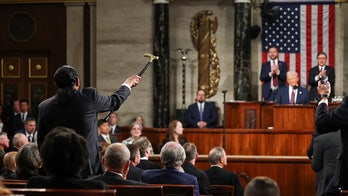
(AP)
PHOENIX -- A federal appeals court on Tuesday struck down a key part of Arizona's law requiring voters to prove they are citizens before registering to vote and to show identification before casting ballots.
The decision by a three-judge panel of the 9th U.S. Circuit Court of Appeals found that the law requiring voters to prove their citizenship while registering is inconsistent with the National Voter Registration Act. That federal law allows voters to fill out a mail-in voter registration card and swear they are citizens under penalty of perjury, but doesn't require them to show proof as Arizona's law does.
The ruling left in place a requirement that voters provide proof of identity when casting ballots.
Lawyers for several civil rights groups that sued argued thousands of Arizonans have had their federal registration forms rejected because they failed to provide other documents required by the state. That violates the federal law, they argued.
The state law in question, Proposition 200, was passed by voters in 2004. It required proof of citizenship during voter registration and of identity at the polls, and also while receiving certain state benefits.
It has been upheld by state and federal courts until Tuesday's decision.
In a statement, one of the attorneys who argued the case said his group was "elated" by the decision.
"This will enable the many poor people in Arizona who lack driver's licenses and birth certificates to register to vote," said Jon Greenbaum, legal director for the Lawyers' Committee for Civil Rights Under Law.
Arizona Attorney General Terry Goddard's office issued a statement saying it intends to ask a full panel of 9th Circuit judges to reconsider the case.
The ruling applies only to voter registration and the deadline for voting in the Nov. 2 general election has passed, so it will have no practical effect on voting, the statement said.
Appeals Court Judge Sandra S. Ikuta's opinion was joined by retired U.S. Supreme Court Justice Sandra Day O'Connor, who heard the case as a temporary appeals court judge. Ikuta said the federal voter registration law laid out specific requirements for the mail-in registration form that the state can't make more onerous.
"There is no room for Arizona to impose ... an additional identification requirement as a prerequisite to federal voter registration for registrants using that form," Ikuta wrote.
The panel's ruling overturned a previous 9th Circuit panel ruling that found Proposition 200 did not violate the National Voter Registration Act.
The 9th Circuit's chief judge, Alex Kozinski, wrote a sharp dissent, saying the ruling ignored precedent and was flat wrong on its legal analysis.
"Few panels are able to upset quite so many apple carts all at once," Kozinski concluded. "Count me out."
Gov. Jan Brewer and Arizona Secretary of State Ken Bennett issued a joint statement calling the decision an "outrage and a slap in the face to all Arizonans who care about the integrity of their elections."
"Arizona voters have made their will crystal clear -- non-citizens do not have the right to vote," they wrote. "We will continue to pursue any and all legal remedies to prevent fraudulent voter registration in the State of Arizona, as well as the right of our state citizens to craft appropriate protections."
The panel agreed with a district court judge who ruled in 2008 that the law does not constitutes a poll tax or disproportionally impact minority voting. It also rejected two constitutional arguments brought by the groups that sued.












































